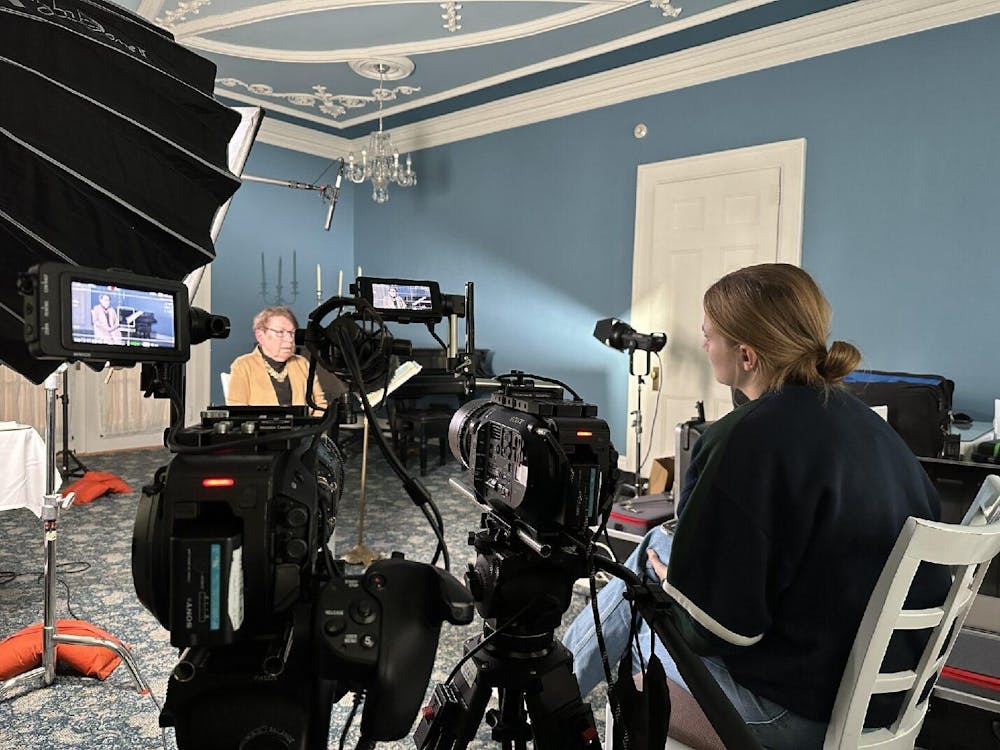The Broadcast Education Association (BEA) ranked Taylor’s Film and Media Arts program as #1 in 2024 Top Winning Documentary Programs in the Festival of Media Arts.
“The rankings are not an overall evaluation of an academic program but an evaluation of the quality and consistency of students’ creative works produced at one institution compared to those at other institutions,” the BEA’s institution ranking page said for the 2024 Recognition of Institutional Excellence in Media. “While the BEA has been evaluating student works for nearly 20 years in competition, the rankings are based on the past five-year period of student success.”
In the micro-documentary category, Taylor film and media arts students Justice Bower, Chloe Gard and multimedia journalism student Enoch Eicher received first place for “orang. utan.” Second place in the short-form documentary category was “Beyond Silence,” created and produced by senior film and media arts students JP Susantio, and graduates Thane Syswerda and Nate Conkel.
“There were 188 entries in documentary, which is 10% basically, of all entries,” Kathleen Ryan, faculty documentary chair of the BEA and professor at University of Colorado, said. “And then of the micro docs, there were 103 entries. So, with 188 student documentaries, 103 of those were micro docs, and so for your fellow students to have won — that's a pretty stiff competition.”
To ensure people are treated fairly, they look for outliers regarding how judges vote on projects, Ryan said. For example, if someone is very critical – the judge gives every film low scores – the film will never hit that 80% target. In that case, the BEA might add another judge to balance the voting.
All judges will have a bias and preference on how certain projects should be done, Ryan said, which is one way the BEA tries to keep judges’ votes as rigorous and fair as possible.
Kathy Bruner, department co-chair and professor of film and media arts at Taylor, and Joshua Taylor, media engineer and adjunct professor of post-production, submitted around 40 student entries to the BEA Dec. 15, taking the better part of two days. Bruner said these entries include other media formats such as audio production. The few projects that are selected are awarded first and second place and the award of excellence.
Bruner said the BEA represents the institutions that offer communication, journalism and broadcasting programs. Taylor’s Film and Media Arts program is not one of those specific programs, but the program still does a lot of projects included in communication and broadcasting programs, Burner said.
Both documentaries were overseen by Bruner. In her documentary class, her syllabus says the assumption is that documentary filmmaking is a powerful art form, conveying truth, motivating action and service, igniting movements of the spirit, demonstrating the redemptive love of Christ and advancing the kingdom of God on earth.
Documentaries do this best when the stories are excellent, beautiful and true, committing to make the best art possible to honor God with hard work, Bruner said.
Senior Elise Masters and Taylor graduates Deokjun Lee and Cullen Carrera produced “Samuel Plato: Preserving a Legacy.” The documentary tells the story of African American architect Samuel Plato. He designed buildings during the Jim Crow era, including Taylor’s Swallow Robin Hall.
However, finding information was difficult; it was not like they could interview Samuel Plato themselves, and it was daunting work to try to bring someone’s untold story to life, Masters said.
“A general kind of life lesson I took away is: Don't judge a book by its cover,” Masters said. “I could have never realized how impactful it would be to get to be a part of such an amazing story, even though it kind of felt dulled by time… once we were done, I could see that it was such, like, an honor to be a part of continuing to tell his story, because I had no place — no relation — to be able to tell that story. Really, I just kind of picked it up and asked people to help us along the way.”
It was a blessing to be involved in telling Plato’s story, Masters said, but her team could not take credit because it’s not their story. The heart of the story is Samuel Plato.
Now, their documentary is being shown in several festivals, including Indiana’s biggest film festival in Indianapolis, Masters said.
“So yeah, any recognition that we get is just kind of gravy, right?” Bruner said. “I guess a better metaphor [is it’s] frosting on the cake. That's [awards] not what we're aiming for, but it's certainly gratifying when other people resonate with the work and are moved.”
In her class, Bruner tells her students they will experience six unforeseen setbacks. The documentary subject may bail out or the story takes an unexpected turn, Bruner said, so students have to problem solve as issues arise.
The film is never going to be what’s expected, Bruner explained. But that’s the fun — the exhilaration of it.




